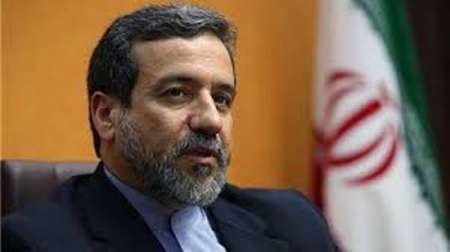The nuclear agreement reached between Tehran and the six world powers is expected to be implemented early in January, a senior lawmaker quoted Deputy Foreign Minister Seyed Abbas Araqchi as saying.
Araqchi was quoted as saying by rapporteur of Majlis National Security and Foreign Policy Commission NozarShafiei.
The Joint Comprehensive Plan of Action (JCPOA) was adopted by Iran and the Group 5+1 (the US, Russia, China, France and Britain plus Germany) in Vienna on July 14.
Araqchi said that except for two cases, all other parts of the roadmap between Iran and the International Atomic Energy Agency has been implemented and IAEA director general will give a report to IAEA Board of Governors within nearly one month.
The deputy foreign minister noted that the IAEA Board of Governors will convene on December 15 to present a resolution that will put an end to the so-called possible military dimensions (PMD) of Iran’s nuclear program.
It is expected that the implementation of the JCPOA will begin within the next two months and the sanctions will be terminated, suspended or stopped under the term of the nuclear deal.
Three supervisory bodies will ensure proper implementation of JCPOA under leader’s guidelines, says Larijani
 Iranian Parliament Speaker Ali Larijani announced that the parliament, government and the Supreme National Security Council (SNSC) will set up special supervisory units to ensure proper implementation of the Joint Comprehensive Plan of Action (JCPOA) based on the directives issued by Supreme Leader of the Islamic Revolution Ayatollah Seyed Ali Khamenei.
Iranian Parliament Speaker Ali Larijani announced that the parliament, government and the Supreme National Security Council (SNSC) will set up special supervisory units to ensure proper implementation of the Joint Comprehensive Plan of Action (JCPOA) based on the directives issued by Supreme Leader of the Islamic Revolution Ayatollah Seyed Ali Khamenei.
“The Iranian parliament, government and the SNSC will set up executive bodies to supervise the JCPOA implementation,” Larijani told reporters on Sunday.
He reiterated that the executive bodies will keep a watchful eye to make sure that the nuclear agreement will come into implementation in full compliance with the Supreme Leader’s directives.
Earlier today, the Iranian parliamentarians in a letter called on President Hassan Rouhani to fully obey the directives issued by Iran’s Supreme Leader on the implementation of the nuclear deal clinched with the world powers in July.
“The government is expected to fully respect the conditions which serve the Iranian nation’s interests in line with the implementation of the law and defending the interests of the great Iranian nation,” the letter said.
It also called for setting up a strong, informed and vigilant team to supervise the implementation of the JCPOA as stated in the Supreme Leader’s October letter to President Rouhani.
The legislators also underlined that Iran shouldn’t take any practical step to implement the JCPOA before US President Barack Obama and the EU’s official statement on the full termination of the financial and economic sanctions against Tehran.
On October 21, Ayatollah Khamenei in a letter to President Rouhani specified a number of conditions for implementing the JCPOA agreed by Tehran and the world powers on July 14.
Ayatollah Khamenei started the letter by appreciating the Iranian team of negotiators, critics, parliamentarians and the media workers for their efforts to provide the public opinion with an almost complete image of the JCPOA, saying that these efforts ended up in highlighting the soft and strong points of the deal.
Then, he referred to the US administration’s continued hostile approach towards Iran even after reaching the nuclear agreement, and said, “The US president’s remarks in two letters to me saying that he doesn’t intend to overthrow the Islamic Republic were soon proved untrue by his support for seditious moves in Iran, financial support for the dissidents opposed to the Islamic Republic and his clear military threats – and even nuclear threats which can lead to filing a detailed lawsuit against him at the international courts- revealed the US leaders’ real intention.”
Ayatollah Khamenei said that the US has shown deceptive behavior during the two years of negotiations, repeated disavowals, accompanied the Zionist regime and picked up a bullying diplomacy to push the European governments and institutes to practice a hostile approach towards Iran, all aimed at advancing Washington’s inimical goals against the Islamic Republic.
He added that the Iranian negotiators showed vigilance against the US administration’s plots and resisted against them during the negotiations, preventing any loss or damage on the country.
He said that despite the Iranian officials’ attention and vigilance, the JCPOA suffers some ambiguities and weak structures which can lead to great losses on the country’s present and future situation.
IRNA, FNA
R.S

